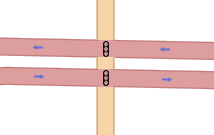Proposal:Traffic signals set
| traffic_signals_set | |
|---|---|
| Proposal status: | Inactive (inactive) |
| Proposed by: | Sanderd17 |
| Tagging: | type=traffic_signals_set |
| Applies to: | relation |
| Definition: | A set of individual traffic signals |
| Statistics: |
|
| Rendered as: | Japanese maps may render only one icon for the traffis signals set (instead of an own icon for each individual highway=traffic_signals node) |
| Draft started: | 2010-12-27 |
| RFC start: | 2010-12-27, and again 2015-02-25, and again 2015-03-14 after name change from traffic_signals_group to traffic_signals_set |
| Vote start: | * |
| Vote end: | * |
A set of individual traffic signals that work together to control the traffic at a road junction and/or traffic signal controlled pedestrian crossing.
Note: This is not about coordination of traffic signals along a length of road or even a district wide coordination of traffic light signals. It’s only about single junctions and/or pedestrian crossings.
Use cases for data consumers
- In Japan, traffic signal sets (as a whole) have names that serve for orientation in the local area. These names are more important for orientation than street names, and they apply to the traffic signal set as a whole. This OSM relation can represent the traffic signal set as a whole. This is necessary for proper rendering of japanese maps because japanese style maps render even for complex traffic signals sets only one icon for the whole traffis signals set (instead of an own icon for each individual highway=traffic_signals node).
- A router could (or should) give a time penalty for passing traffic lights since sometimes you have to stop. How heavy the penalty is depends on the type of roads that cross. But big roads have normally two separated sets of lanes, sometimes a separated cycleway and all those crossings have a tag highway=traffic_signals. This relation could help routing software to make a better estimate.
Tagging scheme
All nodes with highway=traffic_signals that belong to a traffic signals set are members of a relation. The relation is tagges with type=traffic_signals_set. Also other useful tags may be added to the relation, like name=* in Japan.
Tags on the relation itself
| Tags | Usage |
|---|---|
| type=traffic_signals_set | mandatory |
| other tags that apply to the traffic signals set as a whole | optional |
Members of the relation and their roles
| Element | Role | Recurrence | Explanation |
|---|---|---|---|
| highway=traffic_signals | one or more (mandatory) | all highway=traffic_signals elements that belong to this traffic signals set (empty role) | |
| a node without any tags | label | zero or one (recommended) | The position where a label or icon for this traffic signal set should be rendered. |
| crossing=traffic_signals | crossing | zero or more (if any) | All crossing=traffic_signals elements that belong to this traffic signals set. |
| junction=yes | junction | zero or one (if any) | The junction element that the traffic signals set controls. |
Examples
- Simple situation: http://www.openstreetmap.org/relation/4568620
- Complex situation: http://www.openstreetmap.org/relation/4568647
- Example overpass querry: http://overpass-turbo.eu/s/8h6
See also
- name=*
- traffic_signals:sound=*
- traffic_signals:vibration=*
- traffic_signals:arrow=*
- traffic_signals:minimap=*
- Proposed features/traffic signals set 2
Tagging guide for Japan
Mostly the name belongs to the traffic signals set as a whole, and not to the individual traffic signals neither the individual highway=traffic_signals nodes. So the correct tagging would be to have a name=* tag at the relation, but no “name” tag at the individual highway=traffic_signals nodes. (But currently type=traffic_signals_set is not rendered, and until it is rendered, we could perhaps keep the existing name=* tags also on the individual highway=traffic_signals nodes.)
Vote
- ...
